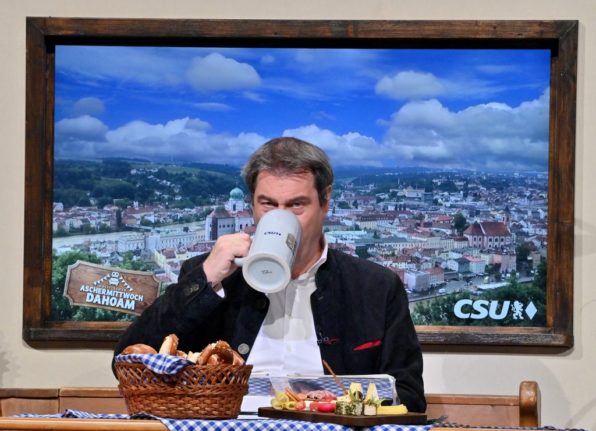1. Cold or frigid?
 Photo: Niq Scott, Flickr
Photo: Niq Scott, Flickr
Stepping out of your door on a chilly winter's morning, you realise that you haven't got nearly enough layers on, and through your chattering teeth you exclaim, “Ich bin kalt!”
But what you thought was an innocent enough exclamation actually has other implications – you’ll unwittingly be announcing to everyone that you are frigid.
To avoid being the laughing stock, don’t forget that all-important reflexive pronoun – make sure you say “mir ist kalt” instead.
2. Cherries or churches?
 Photo: strollerdos, Flickr
Photo: strollerdos, Flickr
It’s a beautiful afternoon and you’re feeling peckish, so what better way to fit right in with the locals than to enjoy the German custom of “Kaffee und Kuchen” (coffee and cake)?
Don’t make the rookie error of ordering “ein Kuchen mit Kirchen” instead of “ein Kuchen mit Kirschen”.
Order the latter and you’ll get a delicious cake with cherries on top. Order the former (a cake with churches on top) and you'll be met with utter confusion.
3. Just fine or the best thing since sliced bread?
 Photo: Vladimir Pustovit, Flickr
Photo: Vladimir Pustovit, Flickr
Responding cheerily “ich bin gut” to the question “wie geht’s?” (“how are you?”) could make you seem rather arrogant as opposed to conveying that you are well.
Declaring “ich bin gut” indicates that you are morally upstanding, highly skilled, and a shining star all round, whereas “mir geht’s gut” means the rather more modest “I’m fine”.
Yep, it’s another case of remembering that reflexive pronoun. Ah grammar, how we love you.
4. Cross the road or crucify the road?
 Photo: Thomas Szynkiewicz, Flickr
Photo: Thomas Szynkiewicz, Flickr
Although “das Kreuz” means “a cross”, using the verb “kreuzigen” to refer to crossing the street is a big no-no: you’ll inadvertently be saying that you want to crucify the road.
Get the correct verb down in your vocab book – it’s “überqueren”.
5. Tasty or laughable?
 Photo: Anastasia Liem, Flickr
Photo: Anastasia Liem, Flickr
Even the best of intentions can sometimes go awry. Eagerly telling your German hosts at dinner, “Das Essen ist lächerlich!”, will not have the desired effect.
Instead of expressing gratitude for such a delicious meal, you will instead be saying that the food is laughable or even ridiculous.
Insulting your hosts will not win you any brownie points, so to avoid getting off on the wrong foot with them, choose the adjective “lecker” instead – you'll charm them in no time.
6. Friend or girlfriend?
 Photo: Brett Sayer, Flickr
Photo: Brett Sayer, Flickr
Linguistically, the lines between purely platonic friendships and romantic relationships can often be blurred in German, as the word “Freund” can signify either a friend or a boyfriend.
If you want to escape the minefield of accidentally implying romantic interest when there is none whatsoever, use “ein Freund von mir” instead.
7. Mist or dung?
 Photo: Pimthida, Flickr
Photo: Pimthida, Flickr
It’s a grey and miserable morning, and swathes of mist greet you as you walk out of your door.
Exclaiming “es gibt so viel Mist!” will not convey that there is a great cloud of mist stifling the air, but rather that there is a lot of dung strewn about, so it’s best to avoid this word unless you’re on a farm.
But in spoken German, “Mist” has another meaning – it's a swearword that you'll hear people on the railway station platform muttering angrily when they miss their train. When you start swearing in German, that's when you know you've moved well and truly past the novice stage and become a true local.
8. Gift or poison?
 Photo: Andrew Kuznetsov, Flickr
Photo: Andrew Kuznetsov, Flickr
Want to make a good first impression?
Enthusiastically offering your host family a “Gift” upon arriving in Germany is definitely the wrong way to go about it, as this false friend means “poison”.
In your eagerness to be polite and to express your gratitude, you’ll be offering them a present which is worlds apart from the tea and chocolate they expected.
If you’d rather not muck up the very first encounter you have in Germany, use the word “das Geschenk” instead.
9. Watered the flowers or ate the flowers?
 Photo: Lucy Haydon, Flickr
Photo: Lucy Haydon, Flickr
On the fence about which past participle is correct?
Then proudly announcing “Ich habe die Blumen gegessen!” rather than “ich habe die Blumen gegossen” means that you’ve definitely chosen the wrong one.
The latter means that you watered the flowers, whereas the former means that you had a rather unusual snack. What a difference one vowel change makes!
10. Bloody steak or damn steak?
 Photo: Kurt Bauschardt, Flickr
Photo: Kurt Bauschardt, Flickr
Ordering a “verdammtes Steak” in a restaurant will get you some weird looks from the waiter.
While English only has one adjective for “bloody” in both senses of the word, German has two – one meaning “having lots of blood” and one meaning “damn”.
Choose the adjective “blutig” when asking for that steak, so that you don’t accidentally swear at the poor waiter!
11. Best friend or beast?
 Photo: Cam Evans, Flickr
Photo: Cam Evans, Flickr
Expressing affection is all well and good, but even if you start getting on like a house on fire with your new German friend, don’t ever call them your “Bestie”.
While British children use this term of endearment like there’s no tomorrow, while skipping down the road arm in arm with their best chum, the word actually means “beast” in Germany.
So that you don't mistakenly offend your pal, refer to them as “mein bester Freund” or “meine beste Freundin” instead.
12. Gate or fool?
 Photo: Markus Stöber, Flickr
Photo: Markus Stöber, Flickr
Homophones can really make your head spin. The noun “Tor” has two different meanings depending on if it has a masculine or neuter article.
Unsuspectingly saying that you saw “der Tor” (the fool) would be quite an insult, whereas saying that you saw “das Tor” (the gate) would be a perfectly innocent expression that a tourist in Berlin might use.
13. Nut or prostitute?
 Photo: Helen, Flickr
Photo: Helen, Flickr
It’s a sweltering summer’s day and you really fancy a nice cold ice cream to cool you down.
Which flavour should you pick, though? Hmm, hazelnut would be a good choice.
But beware: if you ask for “Nutte”, you will be met with stares of incredulity. You’ve just ordered a female prostitute. Use the word “Nuss” instead.
For all The Local's guides to learning German CLICK HERE


.jpg)



 Please whitelist us to continue reading.
Please whitelist us to continue reading.
Member comments